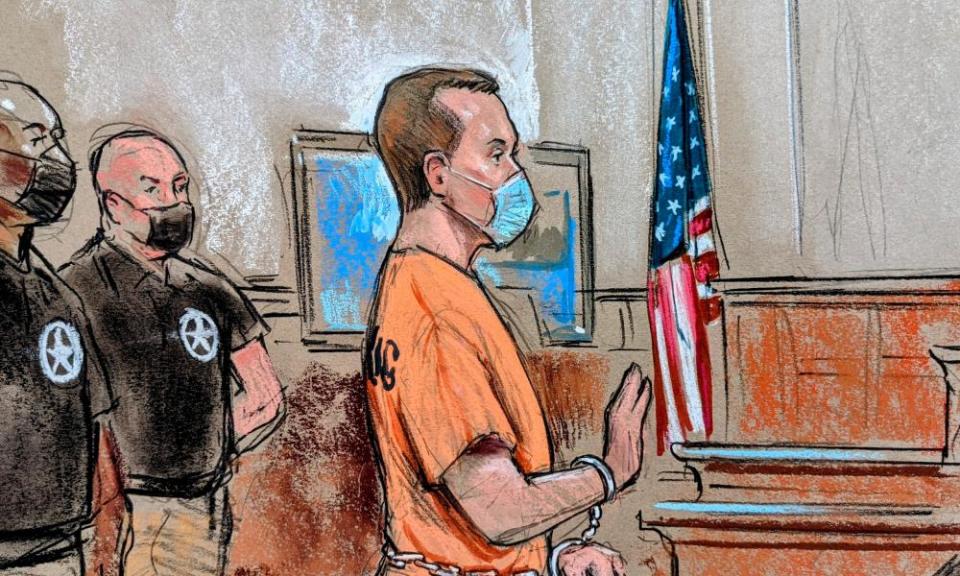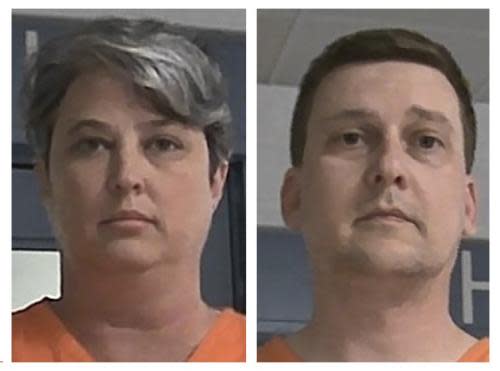Spies next door? The suburban US couple accused of espionage

When accused spies Jonathan and Diana Toebbe were escorted into a West Virginia court to be arraigned on espionage charges, they looked as any middle-aged, suburban couple might: struck by a dramatic turn in circumstances that comes when placed in an orange jumpsuit and restricted by manacles.
But the story of the Toebbes, 42 and 45, is now about as far from typical suburbia as you can get. It’s a story that reads like a fictional spy caper, blending a seemingly normal couple with high technology and low espionage.
He worked on submarine nuclear propulsion, including secret technology devised to reduce the noise and vibration of submarines. She was a socially aware kindergarten teacher at a private school on the bay-front of Annapolis, Maryland.
Two days after being arrested last weekend while allegedly performing a dead drop, they were facing a government complaint that they had “sold information known as restricted data concerning the design of nuclear-powered warships to a person they believed was a representative of a foreign power”.

According to the complaint, it was the couple’s third dead drop since April at drop sites in Jefferson, West Virginia, and another in Pennsylvania.
At each drop, the intended recipient for the encrypted memory cards containing “militarily sensitive design elements, operating parameters and performance characteristics of Virginia-class submarine reactors” turned out to not be from “COUNTRY1’s military intelligence agency” but undercover FBI agents, working in conjunction with the Naval Criminal Investigative Service, in what former intelligence officials describe as a classic “false flag” operation.
While the Toebbes were digesting their new jailhouse surroundings, neighbors in Annapolis were adjusting to their new reality, too, after having a dozen black Suburbans pull-up outside the couple’s split-level house in Annapolis, Maryland, last Saturday morning and about 30 armed FBI agents jump out.
“We kind of connected the dots because people knew he worked for a nuclear program,” said neighbor Chelsea Trotter. “So in a way it was a relief that it wasn’t a violent crime or something.”
On Tuesday, the couple’s second and third car – a Mini and a Nissan – sat in the drive. A yellow bike stood propped against the house. A doormat read: “Knock or Ring to let us give you this song of our people.” Their children, aged 15 and 21, and their two pitbulls, who had been barking inside, had been collected by family members.
Most neighbors said they had never had much to do with the Toebbes. They seemed distant and withdrawn and, in a sense, superior.
Her online persona was very different from her interactions in person
Neighbor Chelsea Trotter on Diana Toebbe
“They were super standoffish. If you waved, there’d be no response,” said Trotter. “That was odd because she worked as a teacher down the street so was obviously interested in community and was active on the communities Facebook page. Her online persona was very different from her interactions in person.”
Officials at Key school, where Diana Toebbe taught, were tight-lipped. Moms in luxury SUVs mostly declined to comment.
Others in the neighborhood theorized on which foreign country was COUNTRY1. In court, observing FBI agents and justice department prosecutors were not forthcoming. It’s likely that it will only be known if that country, which tipped off the FBI that it had been approached some months after initial contact was allegedly made by Jonathan Toebbe, approves.
“What’s striking is the level of cooperation to place a signal inside the embassy and that he refers to himself as an amateur when his tradecraft was quite sophisticated,” said one former intelligence official who requested anonymity.
The evidence in the court papers backs that up.
Jonathan Toebbe, posing as “Alice” and taking precautions to identify his correspondent as genuine, asked for “some physical signal you can make that proves your identity to me”.
“I could plan to visit Washington DC over the Memorial Day weekend. I would just be another tourist in the crowd. Perhaps you could fly a signal flag on your roof? Something easily observable from the street, but nothing to arouse an adversaries suspicion?”
The FBI agreed. “We will set a signal from our main building observable from the street. It will bring you comfort with signal on display from area inside our property that we control and not a [sic] adversary,” agents wrote back.
COUNTRY1 went along with placing the signal from Saturday night to Sunday morning to allay Toebbe’s fears.
But who would that country be? Only six countries currently have nuclear-powered submarines; the UK, US, China, Russia, India and France. The technology Toebbe offered concerned improved, probably quieter, propulsion so not useful to any power that didn’t already already have nuclear propulsion.
Russia and China would probably not cooperate with a false flag counter-espionage operation, say former intelligence officers. Meanwhile, the UK has long been in partnership with the US on its nuclear fleet, and recently strengthened that alliance with the Aukus deal, convincing Australia to ditch a troubled diesel sub contract with France in a favor of cooperatively built US-UK nuclear models.
As described in the complaint, the Indian embassy in Washington doesn’t fit the description of “an area inside our property that we control”. A leading candidate for COUNTRY1, says the former intelligence official, is France.
“This story has become more important because of what happened between the US, Australia, UK and France but it’s not really anything new,” said Dr Andrew Hammond is Historian & Curator at the International Spy Museum.
“Not many countries can utilize this type of technology so is the identity of the country in question going to be well covered up, or become a poorly kept secret?”
From counter-intelligence officer Robert Hanssen, serving 20 life sentences, to CIA case officer Aldrich Ames, naval petty officer John Walker – even Edward Snowden, the idealist whose picture also hangs on the wall of spies at the National Counter Intelligence Center in Bethesda – the Toebbes’ alleged spycraft sits within a tradition of American domestic espionage.

“It’s an interesting case to place into an historical context. There are these echoes of traditional spycraft: the dead drop, hiding secrets in mundane items like peanut sandwiches,” said Hammond.
“But this an all-American couple with social media accounts, two kids and good jobs, with secrets to hide. Despite the risk, and their moral and legal obligations, they seem to have decided to play the game for themselves. There’s people out there who think they’re smarter than everyone else, yet he made quite an unintelligent decision.”
The Toebbes initiated their espionage for comparatively little in return: just $100,000 in cryptocurrency received, according to the justice department.
In Annapolis this week, neighbors were perplexed. “From what I gather they didn’t get a whole lot of money,” said retired school teacher Tom Rankin. “It seemed very odd to put yourself at risk for that kind of money.”
To H Keith Melton, an intelligence historian and a specialist in espionage tradecraft, noted that Toebbe’s boast that he had carefully removed documents from a nuclear propulsion lab outside Pittsburgh points to a dangerously high level of self-regard.
“One day, when it is safe, perhaps two old friends will have a chance to stumble into each other at a cafe, share a bottle of wine and laugh over stories of their shared exploits,” he unwittingly wrote to the FBI.
“Nuclear scientists often think they’re cleverer than anyone else,” said Melton.

 Yahoo Finance
Yahoo Finance